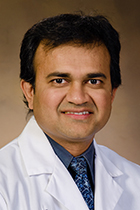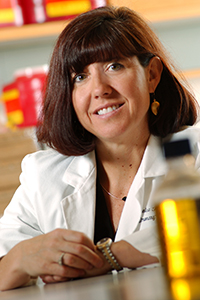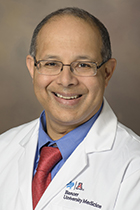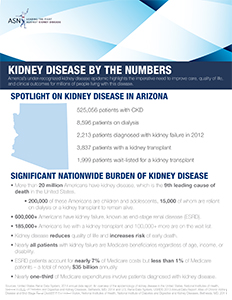Cheers to nephrologist Bijin Thajudeen, MD, MBBS, a University of Arizona assistant professor of medicine and the first physician in Tucson or Phoenix to sign and return his BUMG Physician Employment Agreement. That makes him the first official member of the Banner – University Medical Group (BUMG) practice plan, which BUMG CEO Jason Krupp, MD, acknowledged in an Oct. 1 email.
Dr. Thajudeen also has been named a Key Clinical Educator in the UA Department of Medicine. As a result, his clinical efforts will decrease to accommodate a protected “academic half-day” funded by the DOM to mentor residents, teach and serve a key role in the residency program.
“Obviously, this is a great opportunity for me,” he said. “Taking this position is a turning point in my career that actually opens me more into the world of academic teaching and training with students and residents.”
 He was nominated for the Key Clinical Educator post by Pradeep Kadambi, MD, former interim chief of the UA Division of Nephrology and director of solid organ transplantation at Banner – University Medical Center Tucson. "This illustrates we're very serious when it comes to academics," Dr. Kadambi said.
He was nominated for the Key Clinical Educator post by Pradeep Kadambi, MD, former interim chief of the UA Division of Nephrology and director of solid organ transplantation at Banner – University Medical Center Tucson. "This illustrates we're very serious when it comes to academics," Dr. Kadambi said.
“It also highlights that our tripartite mission at the UA College of Medicine — innovative health care research, education and training, and excellent patient care — will not change in the partnership with Banner,” said Monica Kraft, MD, chair of the UA Department of Medicine. 
Dr. Thajudeen earned his medical degree in India from the University of Kerala in Thiruvananthapuram, Kerala. He did his residency in internal medicine and a fellowship in nephrology at the UA College of Medicine – Tucson. He completed his residency in 2011 and the fellowship in 2013, when he joined the faculty at the UA Division of Nephrology and staff at Banner – University Medical Center Tucson.
He previously was a junior medical officer at PNNM Hospital in Kollam, Kerala, India; a post-graduate trainee in internal medicine at the University of Kerala Medical College; a physician at the Government Health Service in northern Kerala; and an assistant professor in internal medicine at the M.E.S. Medical College in Perinthalmanna, Kerala.
At the UA, he was chief fellow in nephrology, recognized for research posters at meetings of the American College of Physicians (ACP), state level winner of the ACP Doctor’s Dilemma Competition, an invited UA advisor and mentor for internal medicine residency students in the nephrology subspecialty research group, and invited CPR faculty for the UA renal pathology lab.
In June, Dr. Thajudeen also took on the medical director role for the outpatient DCI dialysis unit in Douglas, Ariz., and started a Chronic Kidney Disease (CKD) clinic there. He’s co-medical director as well at the DCI Desert Dialysis Center South at 1011 E. Pennsylvania St. in Tucson. UA Nephrology staff now hold the medical directorships at all four DCI dialysis units in Southern Arizona, which also include one in Green Valley and the Desert Dialysis Center North at 2022 E. Prince Road, too.
His role at the Douglas dialysis unit is particularly important to access to and continuity of care in a community which lost its only hospital at the end of July. The medical director hosts monthly staff meetings and has to be on call for any consultations required because of patient conditions. Travel to and from Tucson requires about five hours, which means an overnight stay for the morning clinics one Wednesday a month. The facility serves about 60 dialysis patients from Douglas, Bisbee and the surrounding area.
“These are patients whose kidneys have failed. Their blood has to be cleaned. We use a hemodialysis machine for that. We have 12 machines there. That means, at the same time, 12 patients can get hemodialysis care. They stay in the machine for up to four hours a day,” he said. Shifts start as early as 5:45 a.m. and patients come on alternating days Monday through Saturday for treatment.
Previously, the directorship was held by a Tucson private practice nephrologist, who still holds clinic there once a month for his area patients, but no longer wanted to be the medical director. Keeping the fees for the directorship as well as patient fees within the UA Division of Nephrology, Dr. Thajudeen admits was part of his motivation in taking on the job — as was his desire to see the UA outpatient dialysis service grow.
“We’re expanding our wings and having more patients, which is good,” he said. “Before, if we had a new dialysis patient who lives in or around Douglas, we just gave it to the private practice.  Now, since we’re going there, we keep it within the division. And about 80 percent of our income in an outpatient setting is generated from dialysis patients. In the hospital, it’s around 40-50 percent of our income that comes from dialysis patients.”
Now, since we’re going there, we keep it within the division. And about 80 percent of our income in an outpatient setting is generated from dialysis patients. In the hospital, it’s around 40-50 percent of our income that comes from dialysis patients.”
Prabir Roy-Chaudhury, MD, PhD, chief of the UA Division of Nephrology, said the Douglas clinic offers an excellent opportunity to employ the UA Telemedicine Program to better serve patients there via remote medical consultations.
Dr. Thajudeen agreed teleconferencing would add to expanding patient access there. He sees CKD patients at a monthly half-day clinic that he would like see grow to a full day. That would allow him to see 10 to 18 patients depending on if they were new or follow-up patients.
He also recognized the opportunity to serve a group of people who might otherwise have had to travel 55 miles or more to Sierra Vista for dialysis care. As such, the clinic also offers an opportunity to reduce disparities in provision of that care to underserved minorities. Most of the patients, he says, are Hispanic.
That reflects state and national statistics, Dr. Roy-Chaudhury said. He noted the incidence of kidney disease is higher among Hispanic-Americans, with their risk of developing kidney failure 1.5 times higher than for non-Hispanics. In Arizona, about half a million people have some level of kidney disease with nearly 10,000 on dialysis. Meanwhile, a third of Medicare expenditures involve patients diagnosed with kidney disease.
“That’s why our focus in Douglas is on the outpatient CKD clinic,” Dr. Thajudeen said. “More important is chronic kidney disease patients coming to our clinic. That’s not only because it’s less expensive to the overall health care system than going to a hospital, but it gets them into treatment sooner to preserve their quality of life. No one wants to live with kidney failure.”



